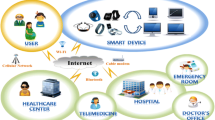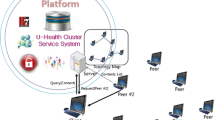Abstract
As IT convergence technique develops, medical technology and apparatus are being modernized opening the era that we can obtain variable information easily anywhere, anytime thanks to wireless communication developed, further. These social changes enabled us to obtain information related to health more efficiently. Modern society is rapidly aging and more people experience chronic diseases because of their wrong eating habit, obesity and insufficient exercise. Thus a demand for health improvement and management at a certain term is increasing rather than complete therapy. Previously, major medical institutions managed personal medical history regarding patients mainly in health management but it is not changing its method to self-utilization and management by individual patient as of now along with medical institutions as fusion technology develops, and individual health record information can easily be checked anywhere, anytime through personal health record (PHR) platform. Unlike developing speed of related technology, however, there is a limitation in expansion, development of individual health record service, personal information security currently. In this paper, we propose mobile service regarding life style improvement targeting high risk chronic diseases based on PHR platform. PHR platform determines high blood pressure, diabetes, hyperlipidemia diseases which are three main chronic diseases using users’ data and can monitor chronic diseases in portable mobile device. Also, the service provides by organically, mutually connected form through feedback towards input from health states of users in mobile device. By proposing contents about service based on efficient individual health record through mobile device that maximized transportability based on PHR platform, proposed method will contribute to industry development and activation of application service development of individual health record. Increase in consistency and reliability through standardization of afterwards health management service is expected to contribute to reduction in social cost and improvement of national health being the basis to realize communication activation of health record between medical institutions, efficient management and education of patients, reduction in dual examinations.










Similar content being viewed by others
Notes
Qualcomm, https://www.qualcomm.com/.
References
Kim, H., Jo, J., Choi, Y., Oh, J., Lee, J., Yoon, K.: Ubiquitous health care system for Chronic disease management. J. Korea Inf. Commun. Mag. 27(9), 3–8 (2010)
Jung, H., Chung, K.Y., Lee, Y.H.: Decision supporting method for chronic disease patients based on mining frequent pattern. Multimed. Tools Appl. 74(20), 8979–8991 (2013)
Park, D., Kim, J., Kim, J., Jung, E., Lee, Y.: U-health service model for managing health of chronic patients in multi-platform environment. J. Korea Contents Assoc. 11(8), 23–32 (2011)
Jung, E.Y., Kim, J.H., Chung, K.Y., Park, D.K.: Mobile healthcare application with EMR interoperability for diabetes patients. Clust. Comput. 17(3), 871–880 (2014)
Cem, A., Kamil, E., Mehmet, E.O.: TeleHealth: intelligent healthcare with M2M communication module. In: Proceedings of the ACM Workshop on Mobile Systems, Applications, and Services for HealthCare, No. 7. (2012)
Shin, D.K., Jung, H., Chung, K., Park, R.C.: M2M-based smart health service for human UI/UX using motion recognition. Clust. Comput. 18, 221–232 (2015)
Jung, H., Chung, K.: Sequential pattern profiling based bio-detection for smart health service. Clust. Comput. 18(1), 209–219 (2015)
Jung, H., Chung, K.: Knowledge based dietary nutrition recommendation for obesity management. Inf. Technol. Manag. 17(1), 29–42 (2016)
Kim, S.H., Chung, K.Y.: Medical information service system based on human 3D anatomical model. Multimed. Tools Appl. 74(20), 8939–8950 (2015)
Kim, J.H., Chung, K.Y.: Ontology-based healthcare context information model to implement ubiquitous environment. Multimed. Tools Appl. 71(2), 873–888 (2014)
Lee, M.S.: Chronic diseases, depressive symptoms and the effects of social networks in Korean elderly population. Korean Assoc. Health Med. Sociol. 27, 5–30 (2010)
Kim, S.Y., Kang, S.M.: Improved glycemic control without hypoglycemia in elderly diabetic patients using the ubiquitous healthcare service. A new medical information system. Diabetes Care 34, 308–313 (2011)
IBM m-Health Wireless Healthcare Solution: http://www.ibm.com/technology
Greenes, R.A.: Clinical Decision Support. Academic Press, Boston (2007)
Anooj, P.K.: Clinical decision support system: risk level prediction of heart disease using decision tree fuzzy rules. Int. J. Res. Rev. Comput. Sci. 3(3), 1659–1667 (2012)
Bodenheimer, T., Lorig, K., Holman, H., Grumbach, K.: Patient self-management of chronic disease in primary care. JAMA 288(19), 2469–2475 (2002)
Hussain, S., Abidi, S.R., Abidi, S.S.R.: Semantic Web Framework for Knowledge-Centric Clinical Decision Support Systems in Artificial Intelligence in Medicine. Springer, Berlin (2007)
Alexandrou, D., Xenikoudakis, F., Mentzas, G.: Adaptive clinical pathways with semantic web rules. In: Proceedings of the International Conference on Health Informatics, vol. 2, pp. 140–147. (2008)
Colantonio, S., Martinelli, M., Moroni, D., Salvetti, O., Perticone, F., Sciacqua, A., Gualtieri, A.: An approach to decision support in heart failure. In: Semantic Web Applications and Perspectives (2007)
Jo, J.H., Kwon, H.S., Yoon, G.H.: Perspectives of Ubiquitous Health Care System for diabetes management. J. Diabetes. Metabol. 30(2), 87 (2006)
Korea Centers for Disease Control and Prevention: In: 6th Korean National Health and Nutrition Examinations Survey (KNHANES V-1). Centers for Disease Control and Prevention (2012)
Jung, H., Yang, J.G., Woo, J.I., Lee, B.M., Ouyang, J., Chung, K., Lee, Y.H.: Evolutionary rule decision using similarity based associative chronic disease patients. Clust. Comput. 18(1), 279–291 (2015)
Lorig, K., Holman, H.: Self-management education: history, definition, outcomes, and mechanisms. Ann. Behav. Med. 26(1), 1–7 (2003)
The Diabetes Control and Complications Trial Research Group: The effect of intensive treatment of diabetes on the development and progression of long-term conplications in insulin-dependent diabetes mellitus. N. Engl. J. Med. 329(14), 977–986 (1993)
Hu, F.B., Manson, J.E., Stampfer, M.J., Colditz, G., Liu, S., Solomon, C.G., Willett, W.C.: Diet, lifestyle, and the risk of type 2 diabetes mellitus in women. N. Engl. J. Med. 345(11), 790–797 (2001)
Oh, S.Y., Ghose, S., Chung, K., Ryu, J.K., Han, J.S.: Recent trends in convergence-based smart healthcare service. Int. J. Technol. Health Care 22(3), 303–307 (2014)
Jo, S.M., Chung, K.: Design of access control system for telemedicine secure XML documents. Multimed. Tools Appl. 74(7), 2257–2271 (2014)
HL7: Health Level Seven International, http://www.hl7.org
Chung, K., Park, R.C.: PHR open platform based smart health service using distributed object group framework. Clust. Comput. (2016). doi:10.1007/s10586-016-0531-7
Jung, H., Chung, K.: PHR based life health index mobile service using decision support model. Wirel. Pers. Commun. 86(1), 315–332 (2016)
Kim, S.H., Chung, K.: Emergency situation monitoring service using context motion tracking of chronic disease patients. Clust. Comput. 18(2), 747–759 (2015)
Jung, H., Chung, K.: P2P context awareness based sensibility design recommendation using color and bio-signal analysis. Peer-to-Peer Netw. Appl. 9(3), 546–557 (2016)
Chung, K., Kim, J.C., Park, R.C.: Knowledge based health service considering user convenience using hybrid Wi-Fi P2P. Inf. Technol. Manag. 17(1), 67–80 (2016)
Jung, E.Y., Kim, J.H., Chung, K.Y., Park, D.K.: Home health gateway based healthcare services through U-health platform. Wirel. Pers. Commun. 73(2), 207–218 (2013)
Acknowledgments
This research was supported by Basic Science Research Program through the National Research Foundation of Korea (NRF) funded by the Ministry of Education (2013R1A1A2059964)
Author information
Authors and Affiliations
Corresponding author
Rights and permissions
About this article
Cite this article
Jung, H., Chung, K. Life style improvement mobile service for high risk chronic disease based on PHR platform. Cluster Comput 19, 967–977 (2016). https://doi.org/10.1007/s10586-016-0549-x
Received:
Revised:
Accepted:
Published:
Issue Date:
DOI: https://doi.org/10.1007/s10586-016-0549-x




